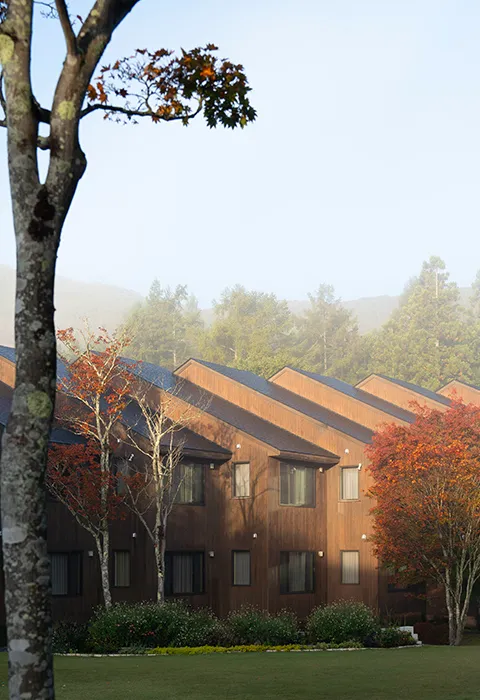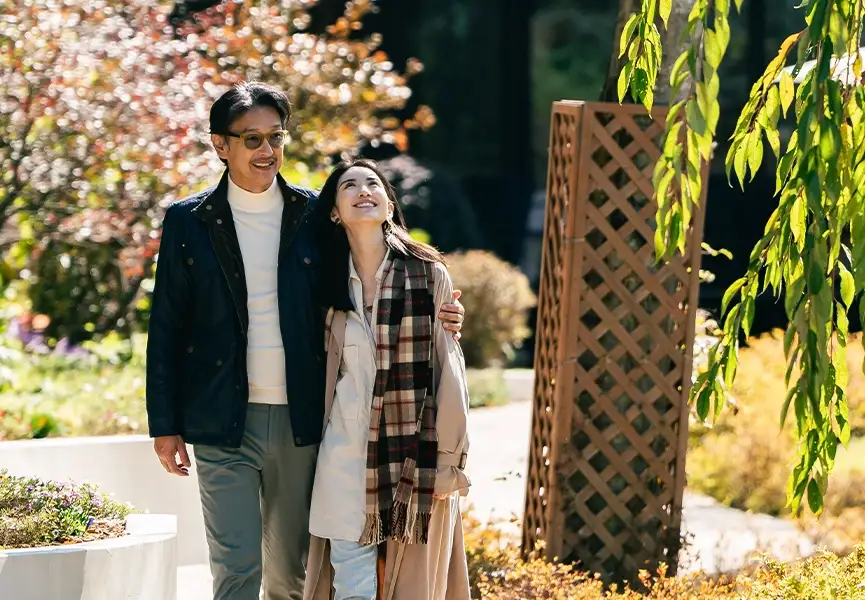
cityguide
- TOP
- City Guide
- A chef who uses his travel experiences to go beyond the boundaries of Chinese cuisine
Hakuba gourmet
2023/09/28
A chef who uses his travel experiences to go beyond the boundaries of Chinese cuisine
After graduating from high school, Abe got a job at a restaurant. He then moved to Canada and Australia, where he changed from being a service staff member to a chef. He gained experience in cooking, mainly French cuisine. After he started his own restaurant, he went beyond French cuisine to try Chinese and Japanese cuisine, continuing to hone his skills through his experiences as a customer. We get a glimpse into Abe's unique thoughts as he serves food all over the world, regardless of genre.
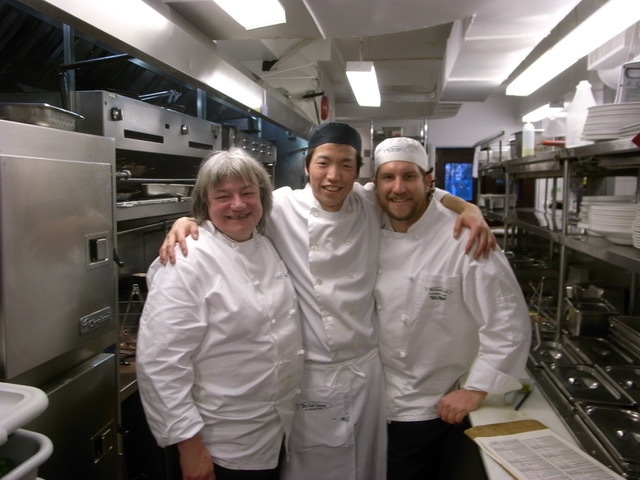
We want to take advantage of the best of both Western and Japanese service.
--First of all, could you briefly tell us about your career history?
After graduating from high school, he began his career at Moegi no Mura Brew Pub Restaurant ROCK, the largest restaurant in his hometown of Hokuto City, Yamanashi Prefecture, where he learned about the joys of service, restaurant operations, and beer.
Since I was a child, I had more opportunities to watch movies than TV, and so I had always dreamed of going to North America and other countries, so I went to Canada on a working holiday. I started out as a waiter at the long-established Vancouver restaurant Fish House in Stanley Park (now closed). I then switched to being a chef midway through my time there. In the winter, I also worked at the nearby ski resort Cypress Mountain.
In 2010, the Olympics were held in Vancouver, and I had the valuable experience of working behind the scenes at a global festival at the Olympic venue. I didn't go to language school, but the English I learned at work became a major foundation for my life there. It was an unforgettable time that broadened my values by experiencing and living with diverse races and cultures.
After returning to Japan, I was invited by the chef I worked with during the Olympics and went to Australia two months later. I worked at Merrits Mountain House and Alpine Hotel in the snow resort of THREDBO in NSW, and at Dorsal Bputique Hotel in Foster in the summer. After returning to Japan, I started learning authentic French cuisine at The Barn in Niseko during the winter.
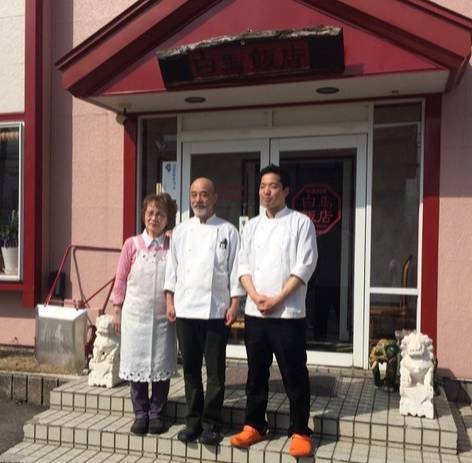
--Could you tell us how you ended up working at Hakuba Hanten?
One year after the Great East Japan Earthquake, he spent six months in Ishinomaki as a volunteer for the reconstruction effort. The experiences and thoughts he gained there have led him to procure high-quality ingredients for his Chinese cuisine from Miyagi Prefecture.
I moved to Hakuba Village in the winter of 2012 and worked as the bar manager and sous chef at a foreign-owned inn in Wadano. Hakuba Village had changed a lot since I came here as a teenager, and it had become a tourist destination that was attracting inbound tourists, which were still few at the time. At the end of the winter, I started working as a helper at Hakuba Hanten after a friend who was working there got injured. I had only intended to stay for six months or a year, but when the original owner retired after 35 years, I took over the restaurant and started working as the owner chef in 2015. And I've been there ever since.
I want to grow together with everyone in the village into a store that everyone can be proud of and that is cherished by people inside and outside the village.
--Chef Abe, you have been active as a chef overseas, but we have just heard that you have returned to Japan to take over a restaurant. Were there any differences between what you did in your overseas restaurants and what confused you?
Although the ingredients and cooking utensils are different, the fundamentals of cooking remain the same. Originally, I had thought I would continue doing French cuisine, but Chinese cuisine is interesting in its own way.
For me, there is no big difference or confusion between being overseas and being in Japan.
I myself originally came from the service industry, so even now I hope to one day be on the service side, or on the side of producing a store. In that regard, I would like to combine the best aspects of Western and Japanese service to provide customers with a great experience.
Even if I continue to cook, I want to have a style of restaurant where I can give the food directly to the customers in a place where they can see it. I like not only management but also working on the front lines. It's hard to be given difficult tasks, but solving them makes me feel good and I feel motivated to keep doing my best!
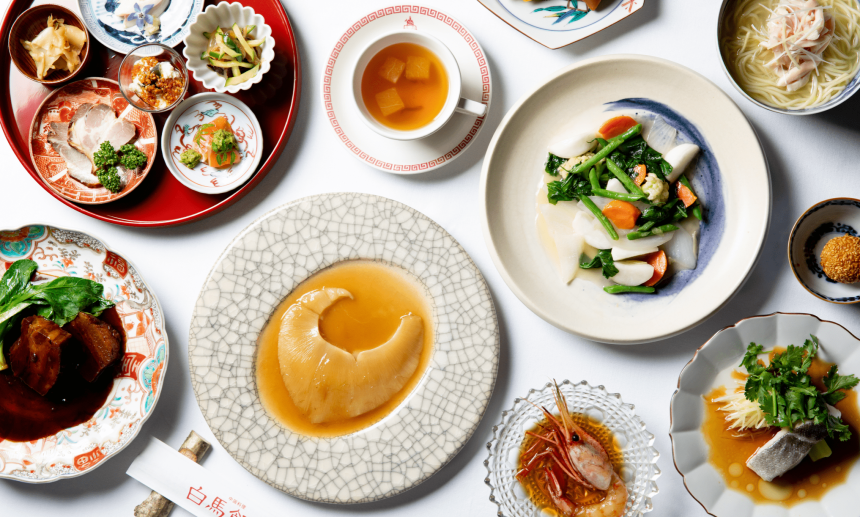
--It's true that even now you often bring the food yourself and explain each dish as you go. Next, please tell us about the concept that Hakuba Hanten has relaunched at Hotel Sierra Resort Hakuba.
Hakuba Chinese Restaurant has been in business for 40 years. How do we create the next 40 years?
I think I need to create a restaurant that, even if something happens to me, someone will want to try. I want to create a restaurant that attracts not only customers, but chefs, sommeliers, and service staff who want to work or study here.
Hakuba Restaurant was born and raised in Hakuba Village, and we want to make it a restaurant that represents Hakuba Village, something that everyone in the village can be proud of and want to recommend to others, so we would like to continue to grow together into a restaurant that is cherished by people inside and outside the village.
As for the cuisine, we of course maintain the traditions of Hakuba Hanten and meet the needs of our customers, but we also incorporate local and seasonal ingredients and strive to create dishes and courses that can only be eaten here. We also place great importance on pairing with wine and other alcoholic beverages, and hope to create a memorable restaurant experience.
With this move, I want to try using ingredients that I haven't been able to use before and improve my own techniques. I want to create light dishes that make you want to eat them again tomorrow, and by using my cooking techniques and original seasonings, I hope to be able to let you feel the taste of the ingredients you are eating at that moment.
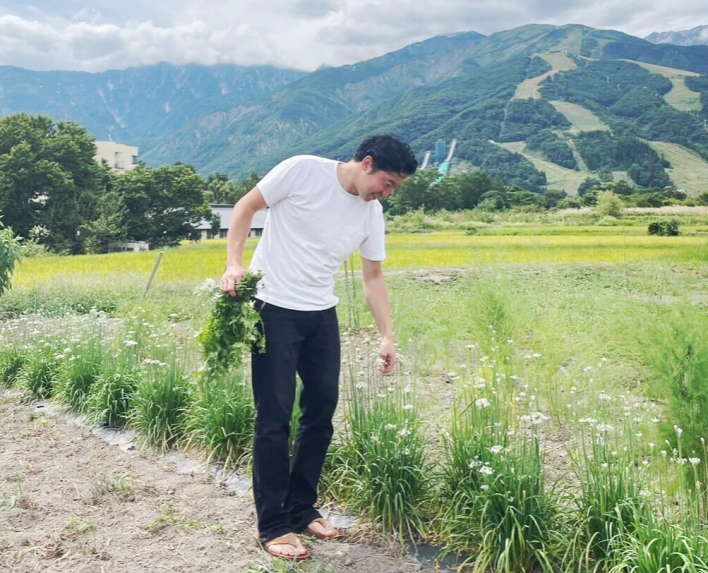 Harvesting chives and coriander in the fields of Otani Farm in Happoguchi.
Harvesting chives and coriander in the fields of Otani Farm in Happoguchi.
I want to challenge myself every day to create dishes and courses that reflect the local area and the season.
--You say you use local and seasonal ingredients, but what are some of the things you're particular about?
If we only offered a single menu item, we would have to keep making the same dishes all year round, and I would have to use ingredients and canned goods that were not in season, which always made me feel uncomfortable.
Since we moved and restarted, we are currently only offering courses. This makes me very excited to be able to cook using ingredients that I have come across so far that I really love and that I want to eat every day. On the other hand, there are also times when ingredients are not available or can not be delivered due to weather or other factors. How to overcome these situations is also something that I need to grow as a person.
Thanks to this, most of the ingredients come from Hakuba, my hometown of Yatsugatake, and Nagano Prefecture. Hakuba may have an image of being deep in the mountains, but it's only an hour's drive from the Sea of Japan. We also incorporate wonderful seafood from the Hokuriku region into our courses.
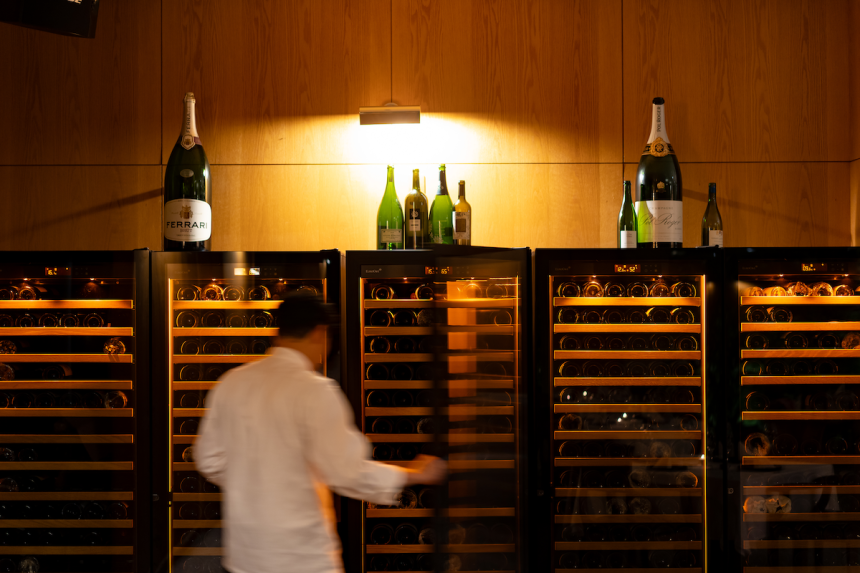 The restaurant's wine cellar is always stocked with over 1,000 types of wine, and we also have a wide selection of drinks to pair with your meal.
The restaurant's wine cellar is always stocked with over 1,000 types of wine, and we also have a wide selection of drinks to pair with your meal.
--When it comes to alcoholic beverages to go with Chinese food, Shaoxing wine is a classic, but why pair it with wine?
Before I joined Hakuba Hanten, I had never really tried Shaoxing wine, so I didn't think of Shaoxing wine as a standard. Rather than being bound by what is considered standard or logic, I approach my dishes with a conscious effort to make the food more three-dimensional by matching it to the characteristics of the ingredients and the dishes.
Simply put, I stock alcohol that I like (laughs). I stock alcohol that I think is delicious, and on top of that, I make dishes that I think are delicious. So I think that the two will naturally go well together. Of course, there are also combinations, such as Japanese sake goes well with this dish, or chilled Shaoxing wine is best with this. However, I think it's interesting in itself that even if you don't drink wine, you can get a sense of my preferences just by looking at the wine list.
--Finally, what do you want to convey to your customers through your cooking?
This is food that can only be eaten in Hakuba Village, because it is Hakuba Village, because it is Nagano, because it is Japan.
This is an experience that can only be had because it was made by a man named Abe Takeshi and because Hakuba Restaurant exists.
I would be happy if you could feel various elements, such as that the food was delicious and that it was fun, from the time and experience you spent at this restaurant.
Please feel free to invite your loved ones to come for a meal. We look forward to seeing you.

